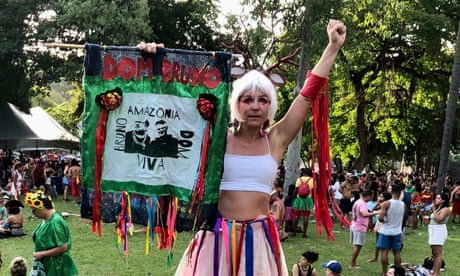Dozens missing in south-eastern São Paulo state as rescue crews search for bodies in the rubble of homes
Search and rescue teams raced to find dozens of people that remained missing after heavy rains devastated coastal areas of Brazil’s south-eastern São Paulo state, as the official death toll rose to 48.
“We are currently working with a tally of at least 38 missing people,” the São Paulo governor, Tarcísio de Freitas, told reporters on Wednesday, as weather forecasters cautioned more rain was on its way.
Massive downpours have caused landslides and flooding in coastal towns of Brazil’s richest state, which has so far been hit by more than 600mm (23.6 inches) of rain, the highest cumulative figure ever in the country.

The number of casualties rose from 46 a day earlier, the São Paulo state government said in a statement. Rescue operations were continuing and firefighters, police and volunteers still hoped to find people alive in the rubble of houses slammed by the landslides. 1,730 people have been displaced and 1,810 left homeless, according to the São Paulo state government.

The city of São Sebastiao, located about 200km (124.3 miles) from São Paulo, bore the brunt of the human toll, with 47 of the reported deaths. But nearby towns such as Ilhabela, Caraguatatuba, Bertioga and Ubatuba were also heavily affected.The state government said more rain was expected on Wednesday as a new cold front favours the formation of heavy clouds over the region, with “moderate to heavy showers” forecast to fall until early evening, after a cloudy morning.
Key roads such as the Mogi-Bertioga and Rio-Santos highways remained blocked due to landslides, the government added, while state-run water company Sabesp managed to restore supply to the region.
Government and private aid groups were scrambling to provide necessities, but the logistics of reaching the isolated towns was creating difficulties.

The homeless are being sheltered in schools, kindergartens and churches in São Sebastiao. About 7.5 tonnes of aid items including food, water and hygiene kits have already been distributed to the victims, according to the state government of São Paulo.
But not all aid has reached its intended destination, with criminals taking advantage of the chaos and looting trucks carrying donations, De Freitas told the G1 news outlet.
Brazil’s environment minister, Marina Silva, visited Barra do Sahy on Wednesday, a district of the hardest-hit mountainous coastal municipality of São Sebastiao. While there, she was confronted by a local resident, Resident Reuri Nascimento, who told Silva he removed 22 bodies using his quad bike. He complained that victims of the floods and landslides had been abandoned and said supplies were not reaching them.
“Why aren’t the police here to help us? There’s food trafficking, we don’t know where the food is going,” he said.
Silva said president Luiz Inácio Lula da Silva’s government was working to improve the situation. “We’re going to have to work to adapt the city, focusing on the poorest who are those who live near the hillside,” Silva said.

On Wednesday a local court granted São Paulo state and the municipality of São Sebastiao permission to force residents from at-risk areas who refuse to move as a last resort, the São Paulo state government said.
The floods in coastal São Paulo state were the latest in a series of such disasters to recently strike Brazil, where poor-quality construction, often on hillsides, can have tragic consequences during the country’s rainy season.
Reuters and Associated Press contributed to this report
… as 2023 gathers pace, and you’re joining us from Uganda, we have a small favour to ask. A new year means new opportunities, and we’re hoping this year gives rise to some much-needed stability and progress. Whatever happens, the Guardian will be there, providing clarity and fearless, independent reporting from around the world, 24/7.
Times are tough, and we know not everyone is in a position to pay for news. But as we’re reader-funded, we rely on the ongoing generosity of those who can afford it. This vital support means millions can continue to read reliable reporting on the events shaping our world. Will you invest in the Guardian this year?
Unlike many others, we have no billionaire owner, meaning we can fearlessly chase the truth and report it with integrity. 2023 will be no different; we will work with trademark determination and passion to bring you journalism that’s always free from commercial or political interference. No one edits our editor or diverts our attention from what’s most important.
With your support, we’ll continue to keep Guardian journalism open and free for everyone to read. When access to information is made equal, greater numbers of people can understand global events and their impact on people and communities. Together, we can demand better from the powerful and fight for democracy.
Whether you give a little or a lot, your funding is vital in powering our reporting for years to come. If you can, please support us on a monthly basis from just $2. It takes less than a minute to set up, and you can rest assured that you’re making a big impact every single month in suppo
